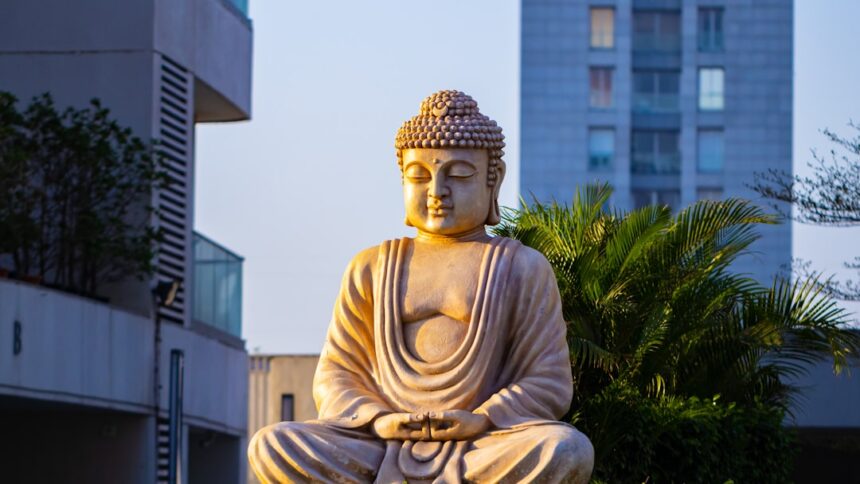Embarking on a spiritual awakening is akin to stepping into a new realm of existence, where the mundane transforms into the extraordinary. You may find yourself questioning the very fabric of your reality, seeking deeper meaning in your experiences. This process often begins with a profound sense of discontent or a yearning for something more significant than the daily grind.
As you navigate this journey, you may encounter moments of clarity that illuminate your path, revealing insights about your true self and your connection to the universe. The spiritual awakening process is not linear; it ebbs and flows like the tides. You might experience periods of intense insight followed by phases of confusion and doubt.
This oscillation can be disorienting, yet it is essential to understand that these fluctuations are part of the journey. Embracing the complexity of your spiritual evolution allows you to cultivate resilience and adaptability. As you delve deeper into your consciousness, you may uncover layers of beliefs and patterns that no longer serve you, paving the way for transformation and growth.
Key Takeaways
- Spiritual awakening is a process of inner transformation and growth.
- Feeling stuck in spiritual growth can manifest as confusion, doubt, or lack of motivation.
- Self-compassion is essential for navigating spiritual plateaus with kindness and understanding.
- Exploring different spiritual practices can help overcome stagnation and bring new insights.
- Seeking guidance from spiritual mentors or community can provide support and perspective in the journey.
Recognizing Signs of Feeling Stuck in Spiritual Growth
As you traverse your spiritual path, there may come a time when you feel stagnant, as if you are treading water without making any progress. Recognizing these signs is crucial for your growth. You might notice a sense of frustration or a lack of motivation to engage in practices that once inspired you.
This feeling of being stuck can manifest as a disconnect from your intuition or an inability to access the insights that once flowed freely. Acknowledging these sensations is the first step toward breaking free from this stagnation. You may also find yourself questioning your beliefs or feeling disillusioned with the spiritual practices that once resonated with you.
This questioning can be unsettling, but it is essential to remember that it is a natural part of the spiritual journey. You might feel as though you are in a cocoon, waiting for the right moment to emerge as a transformed being. By recognizing these signs, you empower yourself to seek new avenues for growth and exploration, allowing your spiritual journey to evolve in unexpected ways.
Cultivating Self-Compassion During Spiritual Plateaus

When you encounter spiritual plateaus, it is vital to practice self-compassion. You may be tempted to criticize yourself for not progressing as quickly as you would like, but this mindset can hinder your growth. Instead, embrace the idea that these plateaus are opportunities for reflection and integration.
Allow yourself to feel whatever emotions arise during these times without judgment. By treating yourself with kindness and understanding, you create a nurturing environment for your spirit to flourish. Self-compassion also involves recognizing that everyone experiences periods of stagnation on their spiritual journeys.
You are not alone in feeling stuck; many others have walked this path before you.
This sense of community can provide comfort and encouragement as you work through your feelings of stagnation, reminding you that growth often occurs in cycles rather than a straight line.
Exploring Different Spiritual Practices to Overcome Stagnation
| Practice | Benefits | Challenges |
|---|---|---|
| Meditation | Reduced stress, increased focus | Difficulty in maintaining regular practice |
| Yoga | Improved flexibility, stress relief | Physical strain for beginners |
| Prayer | Inner peace, sense of connection | Distractions and lack of focus |
| Mindfulness | Increased self-awareness, emotional regulation | Difficulty in staying present |
When faced with stagnation, exploring new spiritual practices can reignite your passion for growth. You might consider incorporating meditation, yoga, or mindfulness exercises into your routine. These practices can help you reconnect with your inner self and cultivate a sense of peace amidst the chaos of life.
Experimenting with different modalities allows you to discover what resonates with you at this moment in your journey. Additionally, engaging in creative outlets such as art, music, or writing can serve as powerful tools for spiritual exploration. These activities enable you to express your emotions and thoughts in ways that transcend words, allowing for deeper insights to emerge.
By diversifying your spiritual practices, you open yourself up to new experiences and perspectives that can help break through the barriers of stagnation.
Seeking Guidance from Spiritual Mentors or Community
As you navigate your spiritual journey, seeking guidance from mentors or joining a community can provide invaluable support. You may find that connecting with others who share similar interests and experiences fosters a sense of belonging and understanding. A mentor can offer insights based on their own experiences, helping you navigate challenges and providing encouragement when needed.
Participating in group activities such as workshops, retreats, or discussion circles can also enhance your spiritual growth. These gatherings create opportunities for shared learning and collective exploration, allowing you to gain new perspectives on your journey. Engaging with others can inspire you to delve deeper into your own practice and remind you that growth is often amplified through connection and collaboration.
Embracing the Role of Patience in Spiritual Development

Patience is a vital component of spiritual development that often goes overlooked. In a world that values instant gratification, it can be challenging to accept that true growth takes time. You may find yourself yearning for immediate results or quick fixes, but embracing patience allows you to cultivate a deeper understanding of yourself and your journey.
Recognizing that spiritual growth unfolds at its own pace can alleviate feelings of frustration and anxiety. As you practice patience, remind yourself that every step on your journey is significant, even if it feels small or insignificant at times. Each moment spent in reflection or contemplation contributes to your overall growth and understanding.
By allowing yourself the grace to move at your own pace, you create space for genuine transformation to occur organically.
Practicing Mindfulness and Presence in Daily Life
Incorporating mindfulness into your daily life can significantly enhance your spiritual journey. By cultivating awareness of the present moment, you allow yourself to fully experience life as it unfolds. This practice encourages you to observe your thoughts and emotions without judgment, fostering a deeper connection with yourself and the world around you.
You might start by setting aside a few moments each day to focus on your breath or engage in mindful activities such as walking or eating. Mindfulness also invites you to appreciate the beauty in everyday moments. Whether it’s savoring a cup of tea or noticing the colors of nature during a walk, being present allows you to find joy in the simple things.
This heightened awareness can lead to profound insights about yourself and your place in the universe, enriching your spiritual journey and helping you break free from feelings of stagnation.
Utilizing Journaling and Reflection for Spiritual Insight
Journaling is a powerful tool for self-discovery and reflection on your spiritual journey. By putting pen to paper, you create a space for your thoughts and feelings to flow freely without judgment. This practice allows you to explore your inner landscape, uncovering insights that may have remained hidden otherwise.
You might find it helpful to set aside time each day or week to reflect on your experiences, emotions, and any questions that arise during your spiritual exploration. In addition to journaling about your experiences, consider using prompts or questions to guide your reflections. For example, ask yourself what lessons you’ve learned during periods of stagnation or how you’ve grown through challenges.
This intentional reflection can provide clarity and direction as you navigate your spiritual path, helping you identify patterns and themes that may inform your next steps.
Embracing Vulnerability and Honesty in Spiritual Exploration
Vulnerability is an essential aspect of spiritual exploration that often requires courage. As you delve into the depths of your being, you may encounter fears or insecurities that challenge your sense of self. Embracing vulnerability allows you to confront these aspects with honesty and openness, fostering deeper connections with yourself and others.
You might find that sharing your struggles with trusted friends or mentors creates an environment where healing can occur. Honesty also plays a crucial role in this process; being truthful with yourself about your feelings and experiences enables authentic growth. Acknowledging where you are on your journey—whether it’s feeling stuck or experiencing breakthroughs—allows for genuine transformation to take place.
By embracing vulnerability and honesty, you create space for deeper understanding and connection within yourself and with those around you.
Letting Go of Expectations and Embracing the Unknown in Spiritual Growth
One of the most liberating aspects of spiritual growth is learning to let go of expectations. You may have envisioned a specific path or timeline for your journey, but clinging to these expectations can lead to disappointment and frustration when things don’t unfold as planned. Embracing the unknown allows you to surrender control and trust in the process of growth itself.
This shift in perspective opens up new possibilities and invites unexpected experiences into your life. As you release expectations, consider reframing challenges as opportunities for learning rather than obstacles to overcome. Each twist and turn on your path contributes to your overall development, even if it doesn’t align with your initial vision.
By embracing uncertainty, you cultivate resilience and adaptability—qualities that will serve you well as you continue on your spiritual journey.
Finding Gratitude and Joy in the Present Moment of Spiritual Awakening
Amidst the complexities of spiritual awakening, finding gratitude and joy in the present moment is essential for maintaining balance and perspective. You may encounter challenges along the way, but cultivating an attitude of gratitude allows you to appreciate the lessons embedded within those experiences. Take time each day to acknowledge what you’re thankful for—whether it’s supportive relationships, moments of clarity, or simply the beauty of nature surrounding you.
Joy can also be found in small moments throughout your day; whether it’s sharing laughter with friends or enjoying a quiet moment alone with your thoughts, these instances contribute to a sense of fulfillment on your journey. By focusing on gratitude and joy, you create a positive feedback loop that enhances your overall well-being and encourages continued growth on your spiritual path. In conclusion, navigating the complexities of spiritual awakening requires patience, self-compassion, and an openness to exploration.
By recognizing signs of stagnation, seeking guidance from others, practicing mindfulness, journaling for insight, embracing vulnerability, letting go of expectations, and finding gratitude in each moment, you empower yourself on this transformative journey toward greater self-awareness and connection with the universe.
If you’re feeling stuck in your spiritual awakening journey, you might find it helpful to explore the insights shared in this article on the Unplugged Psych website. It delves into common challenges faced during spiritual growth and offers practical tips to navigate through them. You can read more about it [here](https://www.unpluggedpsych.com/sample-page/).
Manifestation is BROKEN (The Dark Psychology of Toxic Positivity)
FAQs
What is spiritual awakening?
Spiritual awakening is a process of self-discovery and inner transformation that leads to a deep understanding of oneself and the world around us. It often involves a shift in consciousness and a heightened sense of awareness.
What are the signs of feeling stuck during a spiritual awakening?
Feeling stuck during a spiritual awakening can manifest as a sense of being stagnant or unable to progress on the spiritual path. It may also involve feelings of confusion, frustration, or a lack of clarity about one’s purpose or direction.
How can feeling stuck during a spiritual awakening be addressed?
Addressing feeling stuck during a spiritual awakening may involve practices such as meditation, mindfulness, self-reflection, and seeking guidance from spiritual teachers or mentors. It can also be helpful to explore and understand the root causes of the feelings of being stuck and work through any underlying issues.
Is feeling stuck during a spiritual awakening a common experience?
Feeling stuck during a spiritual awakening is a common experience for many individuals on the spiritual path. It is a natural part of the process of growth and transformation, and it is often a sign that deeper inner work is needed.
Can feeling stuck during a spiritual awakening be a temporary phase?
Yes, feeling stuck during a spiritual awakening can be a temporary phase. With self-awareness, self-care, and the right support, individuals can move through this phase and continue their spiritual journey with a renewed sense of purpose and clarity.




